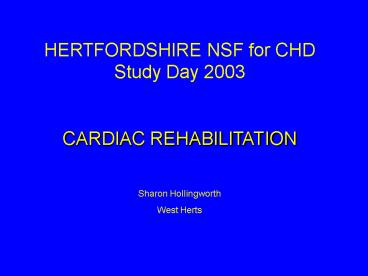HERTFORDSHIRE NSF for CHD Study Day 2003 - PowerPoint PPT Presentation
1 / 24
Title:
HERTFORDSHIRE NSF for CHD Study Day 2003
Description:
Improved physical fitness. WHERE? Variety of settings -church halls -patient's own home ... gym and OT dept) -HHGH Tudor wing -WGH lecture room and local gym ... – PowerPoint PPT presentation
Number of Views:36
Avg rating:3.0/5.0
Title: HERTFORDSHIRE NSF for CHD Study Day 2003
1
HERTFORDSHIRE NSF for CHD Study Day 2003 CARDIAC
REHABILITATION Sharon Hollingworth West Herts
2
- What?
- Why?
- Where?
- Who?
- How?
3
WHAT?
4
CARDIAC REHABILITATION (WHO, 1993) ..the sum
of activities required to favourably influence
the underlying cause of the disease, as well as
to ensure the patients the best possible
physical, mental and social conditions so that
they may, by their own efforts, preserve, or
resume when lost, as normal a place as possible
in the life of the community. Rehabilitation
cannot be regarded as an isolated form of
therapy, but must be integrated with the whole
treatment, of which it forms only one facet.
5
- INFLUENCES ON CR
- British Association of CR (BACR)
- -guidelines
- -CR is best practiced by a multidisciplinary
team - NSF
- -states that CR should be delivered by
healthcare professionals with a range of skills
and should include exercise prescription,
lifestyle interventions, cognitive behavioural
therapy and advanced life support
6
STANDARD TWELVE of the NSF NHS trusts should
put in place agreed protocols/systems of care so
that, prior to leaving hospital, people admitted
to hospital suffering from CHD have been invited
to participate in a multidisciplinary programme
of secondary prevention and CR. The aim of the
programme will be to reduce their risk of
subsequent cardiac problems and to promote their
return to a full and normal life.
7
- Pre-op
- Phases 1-4
- In-patient
- Immediate post-discharge
- Outpatients rehabilitation programme
- Long-term maintenance
8
- COMPONENTS INVOLVED
- Education
- Exercise
- Counselling
9
WHY?
10
- Reduction in morbidity and mortality
- 20-25 ltmortality over 3yr follow-up (Oldridge)
- Reduction in Cardiac risk factors
- Psychological benefits
- Improved physical fitness
11
WHERE?
12
- Variety of settings
- -church halls
- -patients own home
- -gymnasiums
- -OT, physio departments
- -GP practices
- Risk stratification
- -ALS training
- .West Herts
- -SACH Maple therapy (physio gym and OT dept)
- -HHGH Tudor wing
- -WGH lecture room and local gym
13
WHO?
14
- (1) Patients
- Myocardial infarctions
- PTCAs
- CABGs
- Valve replacements
15
- (2) CHD professionals
- Multidisciplinary team-
- -cardiologist
- -clerical
- -dietician
- -exercise physiologist
- -nurse
- -OT
- -pharmacist
- -psychologist
16
- Knowledge base required
- Anatomy and physiology of cardiac function
- Process of cardiovascular disease
- Health psychology
- Theories of adult education
- Theories of motivation and change
- Counselling skills
- Exercise physiology
- Individual exercise prescription
- Management of emergencies
- Nutrition and weight loss
- Audit and evaluation
- Research
- Management and administration
17
HOW is it done?
18
(No Transcript)
19
- 7 week rolling programme
- Two sessions/week
- Each session- 1hr exercise plus 1hr education
- Individual assessment/support
- Discharge assessment
20
EXERCISE
21
RELAXATION
22
- EDUCATION
- Anatomy and physiology of CHD
- Medication
- CHD risk factor management
- Stress management
- CHD interventions
- Return to normal way of life
23
DIET
24
(No Transcript)































